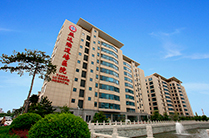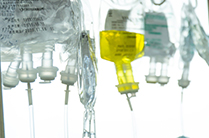Conditions Treated
What are some diseases that may benefit from blood and bone marrow transplant?
The following diseases are the ones that most commonly benefit from blood and bone marrow transplant:
- • Leukemias
- • Severe aplastic anemia
- • Lymphomas
- • Multiple myeloma
- • Immune deficiency disorders
While blood and bone marrow transplantation can be curative for many individuals, patients experience diseases differently, and blood and bone marrow transplant may not be appropriate for everyone who suffers from these diseases.
Common conditions treated include:
Acute leukemias
Acute myelogenous leukemia (AML)
Disease status:
• First, second or subsequent remission
• Induction failure
• Relapse
Transplant type:
• Allogeneic, related donor
• Allogeneic, unrelated donor
Acute lymphoblastic leukemia (ALL)
Disease status:
• First, second or subsequent remission
• Induction failure
• Relapse
• Allogeneic, unrelated donor
Chronic leukemias
Chronic myelogenous leukemia (CML)
Disease status:
• Chronic, accelerated or blast phase
Transplant type:
• Allogeneic, related donor
• Allogeneic, unrelated donor
Chronic lymphocytic leukemia (CLL)
Disease status:
• High risk disease
• Relapse
Transplant type:
• Allogeneic, related donor
• Allogeneic, unrelated donor
Lymphomas
Hodgkin's disease
Disease status:
• First or subsequent relapse
• Second or subsequent remission
• Failure to achieve a complete response
Transplant type:
• Autologous
• Allogeneic, related donor
• Allogeneic, unrelated donor
Disease status:
• First or subsequent relapse
• First remission with high risk disease
• Second or subsequent remission
• Failure to achieve a complete response
Transplant type:
• Autologous
• Allogeneic, related donor
• Allogeneic, unrelated donor
Plasma cell dyscrasias
Disease status:
• Stage I (select diseases)
• Stage II or III
• First or subsequent relapse
Transplant type:
• Autologous
• Allogeneic, related donor
• Allogeneic, unrelated donor
Other hematologic diseases
Aplastic anemia (AA)
Transplant type:
• Allogeneic, related donor
• Allogeneic, unrelated donor
• Allogeneic, related donor
• Allogeneic, unrelated donor
• Allogeneic, related donor
• Allogeneic, unrelated donor
• Allogeneic, related donor
• Allogeneic, unrelated donor
• Allogeneic, related donor
• Allogeneic, unrelated donor
• Allogeneic, related donor
• Allogeneic, unrelated donor
• Autologous
• Autologous
• Allogeneic, related donor
• First, second or subsequent remission
• Induction failure
• Relapse
Transplant type:
• Allogeneic, related donor
• Allogeneic, unrelated donor
Acute lymphoblastic leukemia (ALL)
Disease status:
• First, second or subsequent remission
• Induction failure
• Relapse
Transplant type:
• Allogeneic, related donor• Allogeneic, unrelated donor
Chronic leukemias
Chronic myelogenous leukemia (CML)
Disease status:
• Chronic, accelerated or blast phase
Transplant type:
• Allogeneic, related donor
• Allogeneic, unrelated donor
Chronic lymphocytic leukemia (CLL)
Disease status:
• High risk disease
• Relapse
Transplant type:
• Allogeneic, related donor
• Allogeneic, unrelated donor
Lymphomas
Hodgkin's disease
Disease status:
• First or subsequent relapse
• Second or subsequent remission
• Failure to achieve a complete response
Transplant type:
• Autologous
• Allogeneic, related donor
• Allogeneic, unrelated donor
Disease status:
• First or subsequent relapse
• First remission with high risk disease
• Second or subsequent remission
• Failure to achieve a complete response
Transplant type:
• Autologous
• Allogeneic, related donor
• Allogeneic, unrelated donor
Plasma cell dyscrasias
Disease status:
• Stage I (select diseases)
• Stage II or III
• First or subsequent relapse
Transplant type:
• Autologous
• Allogeneic, related donor
• Allogeneic, unrelated donor
Other hematologic diseases
Aplastic anemia (AA)
Transplant type:
• Allogeneic, related donor
• Allogeneic, unrelated donor
Myelodysplastic syndrome (MDS)
Transplant type:• Allogeneic, related donor
• Allogeneic, unrelated donor
Myeloproliferative diseases (MPN)
Transplant type:• Allogeneic, related donor
• Allogeneic, unrelated donor
Paroxysmal nocturnal hemoglobinuria (PNH)
Transplant type:• Allogeneic, related donor
• Allogeneic, unrelated donor
Hemophagocytic lymphohistiocytosis (HLH)
Transplant type:• Allogeneic, related donor
• Allogeneic, unrelated donor
Thalassemias
Transplant type:• Allogeneic, related donor
• Allogeneic, unrelated donor
Amyloidosis
Transplant type:• Autologous
Waldenstrom's macroglobulinemia
Transplant type:• Autologous
• Allogeneic, related donor














 京公网安备13108202000843号
京公网安备13108202000843号